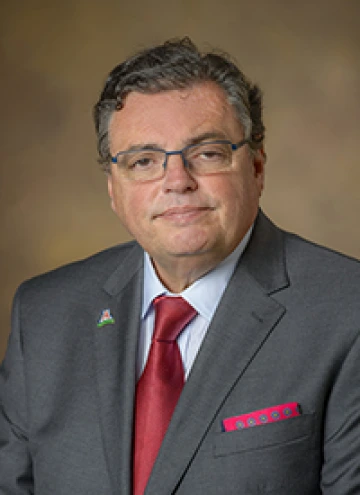Dr. Monica Kraft to Lead All of Us Research Program at UArizona and Banner Health
TUCSON, Ariz. – Monica Kraft, MD, an internationally noted physician-scientist and longtime chair of the Department of Medicine at the University of Arizona College of Medicine – Tucson, has been named contact principal investigator for the UArizona – Banner Health All of Us Research Program.
Since 2017, UArizona and Banner have partnered in this landmark national research effort that seeks to inform thousands of research studies, covering a wide variety of health conditions.
Funded by the National Institutes of Health (NIH), the All of Us Research Program is a historic effort to collect and study data from at least 1 million people in the United States. By building one of the world’s largest and most diverse databases for biomedical research, scientists will better be able to make significant strides toward fulfilling the promise of precision treatments for individual patients and diverse populations.
“In her new role, Dr. Kraft will lead the UArizona – Banner program’s efforts to ensure diverse populations are well-represented in the national All of Us database,” said Michael D. Dake, MD, senior vice president for UArizona Heath Sciences. “To date, the program has enrolled nearly 40,000 core participants throughout Arizona and Colorado, with more than 82% from communities historically underrepresented in biomedical research.”
Dr. Kraft, who joined the College of Medicine – Tucson in 2014, also holds the Robert and Irene Flinn Endowed Chair of Medicine, and is deputy director of the UArizona Health Sciences Asthma and Airway Disease Research Center.
An international expert in pulmonary medicine who specializes in translational asthma research, with a focus on precision medicine therapies to treat severe asthma, her research has been funded by the NIH and the American Lung Association for 25 consecutive years.

In 2019, Dr. Kraft was named the Arizona Bioscience Researcher of the Year for her commitment to pushing the frontiers of science for the betterment of people in Arizona and throughout the world. She also serves on the National Heart, Lung, and Blood Institute Advisory Council.
In addition to Dr. Kraft’s appointment, Michael M.I. Abecassis, MD, MBA, dean of the College of Medicine – Tucson and professor in the Departments of Surgery and Immunobiology, has been named a co-investigator for the All of Us Research Program.
Dr. Abecassis is a nationally recognized leader in medicine who has successfully been guiding the College of Medicine – Tucson into a new era of medical training, scientific discovery and patient-care delivery. He has received continuous funding from the NIH for the past 24 years, serving as principal investigator for several major research grants, including translational and clinical studies investigations regarding biomarkers for both kidney and liver transplant recipients.
# # #
NOTE: Photo available here – https://arizona.box.com/s/2leefvyez5iw56dj765w6aj3ydms11uj.
About the University of Arizona College of Medicine – Tucson
The University of Arizona College of Medicine – Tucson is shaping the future of medicine through state-of-the-art medical education programs, groundbreaking research and advancements in patient care in Arizona and beyond. Founded in 1967, the college boasts more than 50 years of innovation, ranking among the top medical schools in the nation for research and primary care. Through the university's partnership with Banner Health, one of the largest nonprofit health care systems in the country, the college is leading the way in academic medicine. For more information, visit medicine.arizona.edu (Follow us: Facebook | Twitter | Instagram | LinkedIn).
About the University of Arizona Health Sciences
The University of Arizona Health Sciences is the statewide leader in biomedical research and health professions training. UArizona Health Sciences includes the Colleges of Medicine (Tucson and Phoenix), Nursing, Pharmacy, and the Mel and Enid Zuckerman College of Public Health, with main campus locations in Tucson and the Phoenix Biomedical Campus in downtown Phoenix. From these vantage points, Health Sciences reaches across the state of Arizona, the greater Southwest and around the world to provide next-generation education, research and outreach. A major economic engine, Health Sciences employs nearly 5,000 people, has approximately 4,000 students and 900 faculty members, and garners $200 million in research grants and contracts annually. For more information: uahs.arizona.edu (Follow us: Facebook | Twitter | YouTube | LinkedIn | Instagram).

